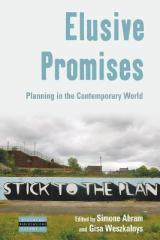<p>
“<em>This is a much needed contribution by anthropologists to a sustained and broad treatment of planning as a socio-cultural process, utilizing multiple case studies from multiple perspectives and theoretical frames. Some very insightful analyses can be found in the chapters, particularly regarding the vast differences between places and people around the world, and their efforts to organize reality through what would commonly, but perhaps inaccurately, be subsumed under the term ‘planning.’</em>” <strong>· Juris Milestone</strong>, Temple University</p>
Planning in contemporary democratic states is often understood as a range of activities, from housing to urban design, regional development to economic planning. This volume sees planning differently—as the negotiation of possibilities that time offers space. It explores what kind of promise planning offers, how such a promise is made, and what happens to it through time. The authors, all leading anthropologists, examine the time and space, creativity and agency, authority and responsibility, and conflicting desires that plans attempt to control. They show how the many people involved with planning deal with the discrepancies between what is promised and what is done. The comparative essays offer insight into the expected and unexpected outcomes of planning (from visionary utopias to bureaucratic dystopia or something in-between), how the future is envisioned at the outset, and what actual work is done and how it affects people’s lives.
- Focuses on the idea of the promise as a way to understand planning through time.
- Ethnographic accounts from highly-regarded anthropologists on planning.
- Comparative study of planning.
List of figures
Acknowledgements
Notes on contributors
Chapter 1. Elusive promises: Planning in the Contemporary World An Introduction
Simone Abram and Gisa Weszkalnys
Chapter 2. Utopian Time and Contemporary Time: Temporal Dimensions of Planning and Reform in the Norwegian Welfare State
Halvard Vike
Chapter 3. Hypercomplexity in collective planning: a case of railway design
Åsa Boholm
Chapter 4. The Invaded City: Structuring an Urban Landscape on the Margins of the Possible (Peru’s Southern Highlands)
Sarah Lund
Chapter 5. Tenure Reformed? State, society and the landless in South Africa
Deborah James
Chapter 6. Redeeming the Promise of Inclusion in the Neoliberal City: Grassroots Contention in Salvador, Bahia, Brazil
John Gledhill
Chapter 7. Even Governmentality Begins as an Image: Institutional Planning in Kuala Lumpur
Richard Baxstrom
Chapter 8. Making a River of Gold: Speculative State Promises and Personal Promises in the Post-Liberalisation Governance of the Hooghly
Laura Bear
Bibliography
Index
Gisa Weszkalnys is Assistant Professor in the Department of Anthropology at the London School of Economics. Her book, Berlin, Alexanderplatz: Transforming Place in a Unified Germany (Berghahn Books, 2010) tackles the intricate politics of place in contemporary Berlin. She is currently working on a manuscript focusing on the temporality and materiality of oil exploitation, specifically in West Africa.
Produktdetaljer
Biografisk notat
Simone Abram is Reader at both Durham University and Leeds Met University, and has worked in interdisciplinary planning departments at Sheffield and Cardiff Universities. Her publications include Culture and Planning (Ashgate, 2011), Rationalities of Planning (with Jonathan Murdoch, Ashgate, 2002), and Anthropological Perspectives on Local Development (co-edited with Jacqueline Waldren, Routledge, 1998).

